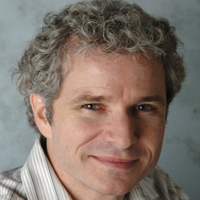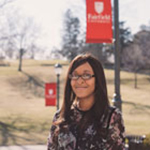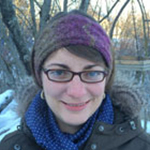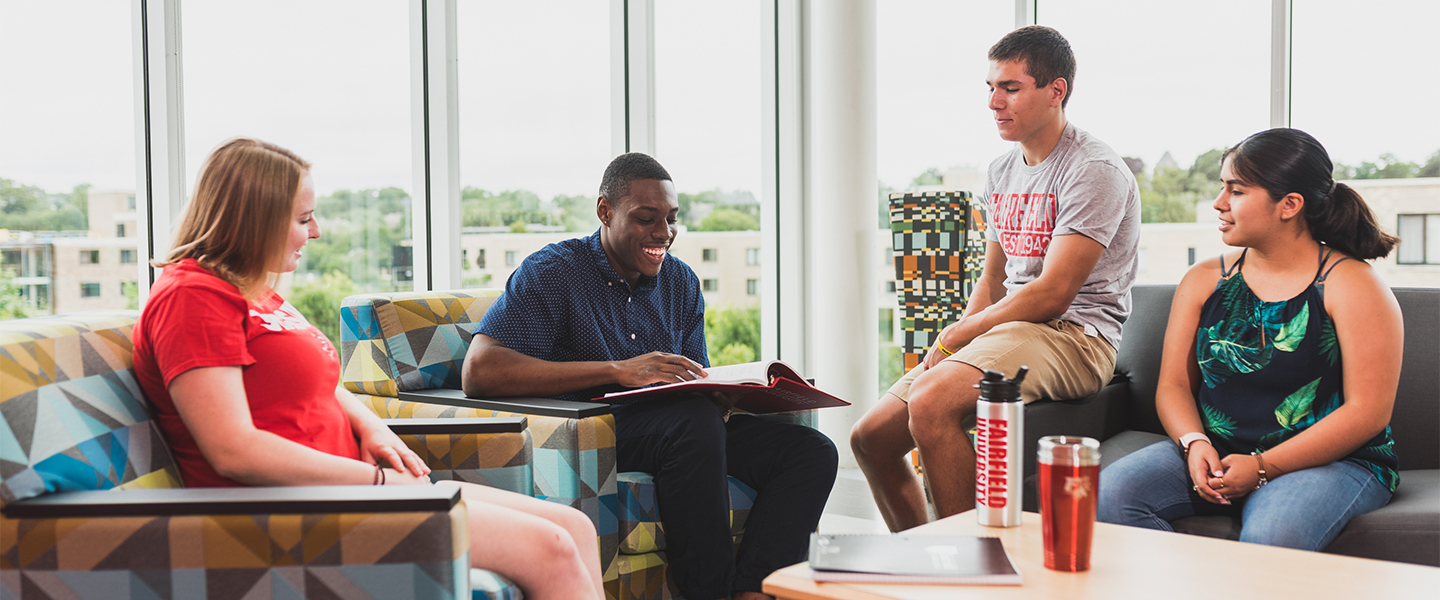Argument Identification & Rebuttal
The ability to identify arguments and provide counter-arguments.
Philosophy is a quest for truth. At Fairfield, the Philosophy Department educates its students to understand the fullness and variety of philosophical study. The program is offered as both a major and minor. Throughout, students acquire an understanding of philosophical topics through the study of great modern thinkers as well as classical scholars.
According to Plato’s Socrates, the love of wisdom (philosophia) begins in wonder. In the nearly 2,500 years since Plato made this observation, philosophy has evolved into a vocation of incessant questioning in which nothing is taken for granted. Today, a variety of traditions and spheres of inquiry continue to grapple with the field’s most enduring questions, questions like: Who am I? Why am I here? What is the nature of reality? How do I know? What should I do?
The Department of Philosophy invites students to take up this vocation by introducing them to its history and aiding them in cultivating the critical and creative thinking necessary for its study.
Fairfield’s location gives you access to stimulating on-and-off campus lectures and seminars across the East Coast. These experiences, combined with the curriculum, lead to a discovery of fundamental values while preparing you for a career in a wide range of fields.

Department Chair
Associate Professor
Philosophy
x3357
P: (203) 254-4100
F: (203) 254-4199
admis@fairfield.edu
1
Argument Identification & Rebuttal
The ability to identify arguments and provide counter-arguments.
2
Assumption Challenging
The critical engagement with and the questioning of one’s assumptions.
3
Action-Value Integration
The thoughtful integration of action with values.
4
Metamorphosis
The existential risking of crisis and transformation through self-reflection.
5
Power of Inquiry
The acceptance of the invitation of philosophy to wonder at the big questions.
Required Courses
| Introduction to Philosophy |
| Logic |
| One (1) 2000-level Philosophy course |
| One (1) Intensive Study on a Major Philosopher course (Courses include: Plato Aristotle Aquinas Descartes Hume Kant Nietzsche Heidegger) |
| Six (6) additional 2000- or 3000-level Philosophy elective courses (At least three of these six courses must be PH 3000 level courses Two of these six courses may be 2000 or 3000 level Applied Ethics courses) |
| Capstone Experience |
| Introduction to Philosophy |
| One (1) 2000-level Philosophy course |
| Three (3) additional Philosophy courses (with departmental guidance) (At least one of these three courses must be a 3000 level Philosophy course One of these three courses may be a 2000 or 3000 level Applied Ethics course) |
A detailed list of course requirements, offerings, and more can be viewed in the University’s course catalog.

Class of '12
Undergrad degree: Major: Sociology and Anthropology, Philosophy minor - Inducted into Fairfield’s chapter of Phi Sigma Tau; The International Honor Society in Philosophy
Current hometown: New Haven, CT
Name of employer: Yale University
Job title & brief description of duties: Research Assistant in the Human Research Protection Program.
My department is responsible for overseeing all research studies at Yale University involving human subjects. Working in a research driven department has inspired me to conduct research of my own. For the past two years I’ve worked on disproving Beal’s Conjecture. In April 2015, I presented my findings in the 19th Annual CMC3 Recreational Mathematics Conference in Lake Tahoe, Nevada. My work was also published in their refereed conference proceedings and was accepted into the MAA MathFest 2015 conference in Washington DC.. The Beal Conjecture, a number theory based on Pierre de Fermat’s 1637 “Last Theorem,” offers a million dollar prize funded by D. Andrew Beal, a prominent banker and mathematics enthusiast.
Why did you choose to attend Fairfield University?
When I was a student at New Haven Academy, I visited Fairfield University with my high school class. When I arrived, I immediately fell in love with the campus. The scenery was gorgeous and it gave off a very nurturing vibe. When I met with the tour guide, she filled me in on the impressive curriculum and the abundance of extracurricular activities. I was thrilled to know there were so many opportunities for students to thrive in this environment. Also, the campus was close enough to New Haven for me to visit my family but far enough away for me to feel a sense of independence. Before I went home that day, I remember feeling a little spark that told me this was going to be my home for the next four years.
How did you select your major/minor? And how did that contribute to your professional and personal life?
I’ve always been fascinated by change. More specifically, not just what goes on around me, but why it occurs and what can be done to make it better? Studying the most prevalent problems that plague society as a whole (sociology), the issues that are impacting different cultures (anthropology) and the belief that one should not blindly take accepted beliefs as “truths”, but question their validity right down to their very existence (philosophy) seemed to be the perfect combination to satisfy my inquisitive nature. These disciplines have greatly influenced my approach to disproving Beal’s Conjecture. My theory argues that in some mathematical cases “positive zero” is different than zero and may even be a positive integer. If this is true, positive zero might be used to disprove Beal’s theory. My solution will require intense debates. It may take up to two years for a decision to be made by the Beal’s committee, particularly since I am challenging the concept of zero.
How did Fairfield’s Jesuit education prepare you for your future?
Fairfield’s Jesuit education influenced my work on Beal’s Conjecture by encouraging me to think outside of the box. The core curriculum is extensive and forces you to tackle subjects outside of your comfort zone. The required subject areas are quite diverse and demand different approaches to complete them. Philosophy in particular questions all perspectives. Concepts are continuously challenged, and philosophical viewpoints can vary drastically from Socrates to Kant and everyone in between.
The professors at Fairfield University have empowered me with a stellar education and always stressed the importance of pushing the envelope. I doubt that I would have attempted to dispute some of the most fundamental rules of mathematics without the influence this school has had on me. Regardless if “positive zero” is deemed applicable in this equation, I feel as though I’ve posed some extremely thought provoking questions that require definitive answers.

Class of '05
Undergrad degree: Philosophy and Religious Studies major, Journalism minor
Current Hometown: Bethel, Alaska
Employer: Tundra Women’s Coalition (TWC)
Job title & brief description of duties: Deputy Director—Youth Services & Prevention. In charge of all grants, programs, and staff that deal with youth and the prevention of sexual assault and domestic violence. DV/SA work is part crisis management work and part long-term strategic prevention planning work.
Why did you choose to attend Fairfield University?
Fr. Charlie Allen said during a Fairfield open house that in the Jesuit tradition you work hard, play hard, and pray hard, and that philosophy of life appealed to me—it was hard core and courageous. Fairfield was the only Jesuit University I had applied to, so I threw in my lot with them to learn more about the Jesuit tradition and to be part of it.
How did you select your major/minor? And how did that contribute to your professional/personal life?
I went to college knowing that I wanted a liberal arts education. I wanted to learn about philosophy and religious studies because I was interested in the subjects without necessarily knowing how to apply them professionally. Classes in these majors involved a lot of close reading, critical thinking, and analytical writing about complicated texts so I gained a lot of professional skills through the work that came from those classes. This led me to believe that I could do anything, professionally, so following graduation I volunteered to work for free with the Jesuit Volunteer Corps.
The same rigorous approach to understanding philosophical and religious texts applies to my personal life. It’s important to me that I treat people with respect and compassion and that I approach life with the intention of doing the right things for the right reasons, as far as I can determine. This needs a lot of close reading, critical thinking and sometimes, analytical writing (not about complicated texts, however). This is an uphill, daily battle, but it feels honest, and I’m often grateful for the insights I gained through those classes in my daily work and daily life.
How did you come to work in your current career field and what inspires you about your work?
Four years of the Jesuit tradition wasn’t enough for me, so when I graduated I joined the Jesuit Volunteer Corps and they put me in Bethel, Alaska which is cold, remote, isolated, and not on the tourist map. I really liked it. Social justice work also appealed to me. I believe that life should be fair for people, and if it isn’t, then that affects my life to the degree that I want to do something about it. TWC is a service agency that offers a 24-hour shelter, crisis line, legal assistance, housing assistance, outreach and education, a children’s program, a teen program, and other resources for people struggling in different ways. The direct service I’m able to provide to individual women, children, and men inspires me to do the much more complicated and frustrating work to make the systems, including our non-profit, change to be more just.
How did Fairfield’s liberal arts education prepare you for your future?
I think one of the best things about my Fairfield experience was how often I was exposed to new thinking, new information, and new experiences. I was on the Debate Team, so I traveled to tournaments all over the east coast, and in Africa and Asia. Moreover, debating was an opportunity to learn about rhetoric, and increase my extemporaneous speaking skills, which then improved my writing skills, which later led to an internship with Commonweal my senior year in college. I was also a staff member of The Mirror and those same skills were improved and refined through that work. The Mirror also taught me how to work with deadlines and has subsequently made me somewhat dependent on them.
Describe the ways that the University’s Jesuit mission and identity had a positive influence on your life
I chose Fairfield because of its Jesuit mission and identity. I didn’t want college to be simply education on the track to gaining a career. I liked that a Jesuit education meant not just learning history and rhetoric and how to write a paper, but learning how to become a part of the world. It was active, intentional, and infused with meaning and expanded far beyond four years in college.
This day-long ethics symposium is designed to identify and amplify the calls to justice embedded within scholarly and activist approaches to climate change, reproductive politics, and racial injustice. The symposium’s panels are designed to highlight both global issues and local expressions of those issues, and will include participation from faculty, students, and members of the community, as well as a collection of invited scholars engaged in groundbreaking work on the intersection of these issues. Participants will walk away with a keener sense of the intersection between the most pressing ethical problems of our day, and a deeper understanding of the modes of conceptual and practical cooperation necessary to address them.

As a Jesuit, Catholic university, Fairfield is dedicated to diversity and inclusion; to radical hospitality in service of racial, social, and economic justice.
Philosophy majors are not limited in their choice of postgraduate careers. Their studies prepare them to be analytical, reflective, and understanding of the fundamental values in any enterprise. The career paths of recent graduates indicate this versatility. Recent philosophy majors have gone into law, medicine, social work, teaching, and investment banking. Those seeking further education have been admitted to graduate and professional programs at Ohio State and Columbia universities, Harvard Medical School, and the law schools at Boston College, Boston University, Fordham, and St. John's.
Learn how Fairfield's Career Services can support your post-graduate goals, and how our tight-knit alumni network can build career and mentoring opportunities that last a lifetime.
If you've ever wondered if a particular career is a good fit for you, internships are a terrific way to find out. Academic credit and noncredit internships are available to Fairfield students in every field and offer hands-on, professional experience at leading companies throughout the region.
The College of Arts and Sciences at Fairfield University is home to a vibrant community of engaged faculty, dedicated staff and budding scholars devoted to the process of invention and discovery and excited by the prospect of producing knowledge in the service of others. Meet the dedicated members of our Philosophy Department.